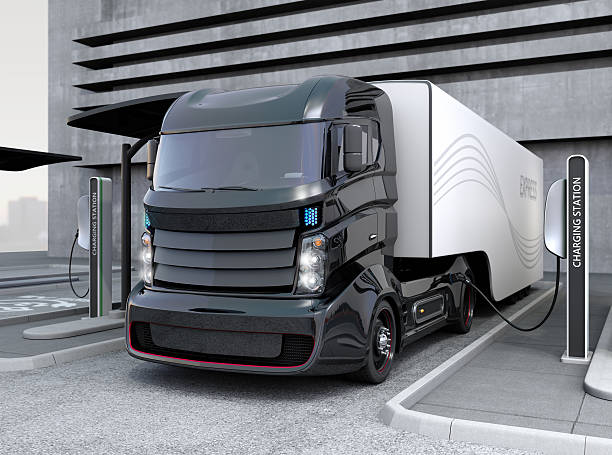Electric Commercial Vehicle Market is projected to reach 722.68 billion by 2030. The rising trend of electric vehicles across industries will be the key factor for the market to attract growth.
The electric commercial vehicle (ECV) market is poised for significant growth in the coming years, driven by a multitude of factors, including stringent government regulations to curb emissions, advancements in battery technology, and increasing demand for sustainable transportation solutions.
Market Size:
The size of the Electric Commercial Vehicle Market was estimated at USD 78.40 billion in 2022 and is projected to grow at a compound annual growth rate (CAGR) of 32% from 2023 to 2030, when it is expected to reach USD 722.68 billion.
Market Scope:
As environmental concerns continue to intensify, governments worldwide are implementing stricter emission standards, incentivizing the adoption of EVs, including commercial vehicles. This regulatory push, coupled with technological breakthroughs in battery performance and range, is paving the way for a more widespread adoption of ECVs. The world transitions towards a more sustainable future, the ECV market is poised to play a pivotal role in decarbonizing transportation and reducing the environmental impact of commercial activities. With continuous innovation and increasing affordability, ECVs are set to revolutionize the transportation landscape, offering a cleaner, greener, and more efficient mode of commercial mobility.
Key Companies:
- Tesla (US)
- Continental (Germany)
- Siemens (Germany)
- Nissan (Japan)
- BYD (China)
- Daimler (Germany)
- ABB (Switzerland)
- Mitsubishi Electric (Japan)
- Proterra (US)
- LG Chem (South Korea)
- Zhongtong Bus Holding Co., Ltd (China)
- Panasonic (Japan)
- Delphi (US)
- Toshiba (Japan)
- Ballard Power Systems (Canada)
Request a Sample Copy of the Research Report:https://www.snsinsider.com/sample-request/2162
Opportunity Analysis:
One of the most compelling opportunities lies in the development of innovative battery technologies that can address the range anxiety concerns associated with ECVs. Breakthroughs in battery chemistry, energy density, and charging infrastructure will be pivotal in alleviating these concerns and paving the way for widespread adoption of ECVs. Another promising opportunity lies in the development of specialized ECV solutions tailored to specific applications. For instance, the demand for electric buses is expected to surge due to government mandates and environmental initiatives. Similarly, the rise of e-commerce and last-mile delivery services is driving demand for electric delivery vans and trucks.
Segment Analysis:
The global electric commercial vehicle (ECV) market is segmented by type into battery electric vehicles (BEVs), plug-in hybrid electric vehicles (PHEVs), and fuel cell electric vehicles (FCEVs). BEVs are the most dominant type of ECV, accounting for over 70% of the market share in 2022. This is due to their longer range and lower emissions compared to PHEVs and FCEVs. PHEVs are expected to grow at a faster rate than BEVs in the coming years, as they offer a compromise between the range of BEVs and the fuel efficiency of FCEVs. FCEVs are the least mature type of ECV, but they have the potential to play a significant role in the future of transportation due to their zero emissions and long range.
Regional Analysis:
The Asia Pacific (APAC) region is poised to witness a surge in the adoption of electric commercial vehicles (ECVs) in the coming years, driven by a confluence of factors such as stringent emission regulations, government incentives, and growing environmental consciousness. This shift towards electrification is expected to reshape the region’s commercial vehicle landscape, with China and India emerging as frontrunners in the ECV market. China, the world’s largest automotive market, is spearheading the ECV revolution with a comprehensive strategy that includes subsidies, charging infrastructure development, and production quotas for electric vehicles. This concerted effort has propelled China to the forefront of ECV adoption, with a market share of over 50% in 2022.
Key Takeaways:
- The market dynamics are witnessing a surge in innovative collaborations between automakers, technology companies, and energy providers, fostering a holistic ecosystem for electric commercial vehicles.
- The emphasis on performance and range optimization is evident, as manufacturers strive to address the unique operational demands of commercial fleets. Lastly, regulatory incentives and stringent emissions standards are propelling the market forward, with governments worldwide incentivizing the transition to cleaner transportation solutions.
Recent Industry Development:
- In August 2023, BYD signed a memorandum of understanding (MoU) with European vehicle leasing company ALD Automotive to supply 10,000 electric trucks over the next five years.
- In October 2023, Nikola announced that it had successfully completed the first over-the-air (OTA) software update for its Nikola Tre battery-electric truck.
About Us:
SNS Insider is one of the leading market research and consulting agencies that dominates the market research industry globally. Our company’s aim is to give clients the knowledge they require in order to function in changing circumstances. In order to give you current, accurate market data, consumer insights, and opinions so that you can make decisions with confidence, we employ a variety of techniques, including surveys, video talks, and focus groups around the world.
Contact Us:
Akash Anand – Head of Business Development Strategy
Email: info@snsinsider.com
Phone: +1–415–230–0044 (US) | +91–7798602273 (IND)
Website: https://www.snsinsider.com
